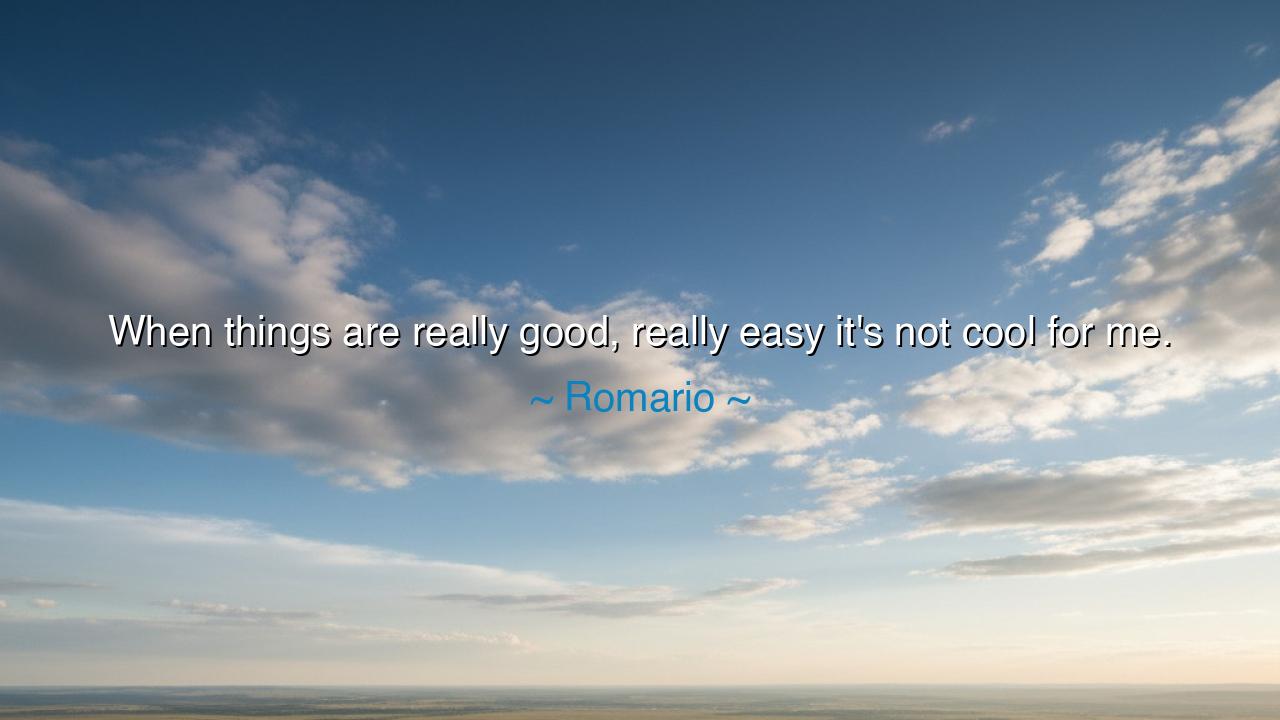
When things are really good, really easy it's not cool for me.






"When things are really good, really easy it's not cool for me." These words, spoken by Romário, a legendary Brazilian footballer, echo a profound truth about the human spirit and the pursuit of greatness. Romário’s statement speaks not only to his personal experience but also to a timeless principle that has guided many of the world’s greatest leaders, artists, and athletes. The idea that difficulty and challenge are necessary components of fulfillment is ancient in its origins, and Romário's words reflect a deep understanding of what it means to truly live a meaningful life. For him, comfort and ease do not lead to growth—they breed stagnation. It is through struggle and adversity that true strength and excellence are forged.
In the ancient world, the greatest heroes and philosophers often recognized that growth and wisdom are born from struggle, not from ease. Hercules, one of the most celebrated heroes of Greek mythology, did not earn his fame through idle comforts, but through his twelve labors—each more challenging than the last. His struggles and trials were not only physical tests but also tests of character, shaping him into a hero whose legend endured. Similarly, Romário's quote resonates with this ancient wisdom: greatness is not attained through ease, but through the willingness to face difficulties head-on, to rise to the challenge, and to prove one's worth through hardship.
Consider the journey of Leonidas of Sparta, the king who led his 300 warriors at the Battle of Thermopylae. Leonidas chose to face the overwhelming might of the Persian Empire, knowing that the odds were stacked against him. He chose not comfort, not safety, but glory and honor in the face of certain death. Leonidas’ decision to fight with his warriors against impossible odds exemplifies the ancient belief that honor and glory come not from easy victories, but from the willingness to endure and face adversity. Like Romário, Leonidas understood that the pursuit of greatness requires facing challenges, sometimes to the point of sacrifice.
The philosophers of the Stoic school, particularly Seneca and Epictetus, also recognized that difficulty was an essential part of the human experience. They argued that adversity strengthens character and that to live virtuously, one must embrace the inevitable hardships of life with grace and resilience. Seneca, in his writings, often reflected on how life’s challenges were opportunities for personal growth, urging his followers to seek out discipline and self-mastery rather than luxury and ease. This Stoic wisdom aligns perfectly with Romário’s perspective—that when life is too easy, it is devoid of the opportunities for growth that come from hardship and struggle.
In the more recent past, the life of Nelson Mandela offers another powerful example of how struggle can lead to greatness. After spending 27 years in prison, Mandela emerged not with bitterness but with a renewed commitment to justice and reconciliation. His life story teaches us that adversity does not break a person; it can make them stronger, more focused, and more resilient in their quest for a greater purpose. Mandela’s journey, like Romário’s insight, underscores the belief that it is not in the absence of challenges that we grow, but in how we meet them, learn from them, and rise above them.
The lesson embedded in Romário’s words is that true excellence and fulfillment come from embracing challenges, from stepping into the arena of struggle rather than retreating into the safety of comfort. Greatness is often born out of adversity, and it is in those moments of hardship that we discover our true strength and purpose. It is through overcoming obstacles—whether in sport, in life, or in the pursuit of a dream—that we realize our potential. To avoid difficulty is to avoid growth. It is the challenges we face that shape us into the people we are destined to become.
In our own lives, we can apply Romário’s lesson by embracing challenge rather than avoiding it. Instead of seeking comfort and ease, we should actively seek opportunities that push us out of our comfort zones and force us to grow. Whether in our careers, relationships, or personal growth, it is the obstacles we encounter that will ultimately define us. Just as Hercules faced his labors with determination, and Mandela endured his imprisonment with resilience, we too must meet our challenges head-on. The pursuit of greatness, of wisdom, and of self-fulfillment is never easy, but it is through the struggle that we find our true purpose and our highest potential.
Romário's wisdom teaches us that life is not meant to be a smooth path; it is the rough terrain, the hard climbs, and the trials that shape us. Let us not shy away from the challenges we face, but embrace them with courage and conviction, knowing that it is in difficulty that we truly discover who we are. Life’s obstacles are not signs of misfortune but opportunities to build a life worthy of honor, strength, and legacy. In embracing the struggle, we become the heroes of our own stories, just as the ancients did before us.






AAdministratorAdministrator
Welcome, honored guests. Please leave a comment, we will respond soon